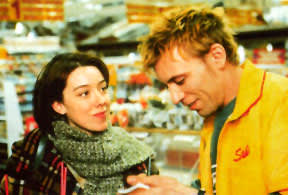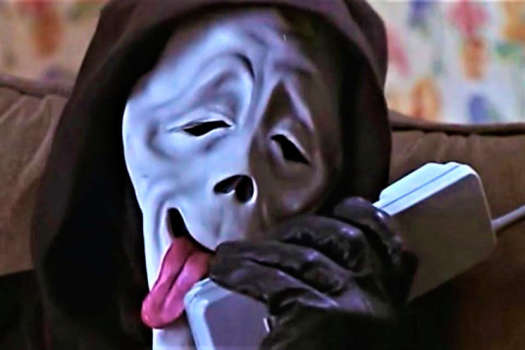There's a brouhaha on a small street in Toronto's Kensington Market, and Twitch City's intrepid talk show host Rex Reilly is there, getting the scoop. Or at least trying to. He yells at Newbie (Callum Keith Rennie) the corner store clerk, who's found himself in the middle of the fray. "What are you on?" Reilly asks. "TV," Newbie yells back. "Right you are," Reilly realises. "So am I."
Viewing even a few brief moments of CBC's returning short series Twitch City, there's no question that it's TV. Television is not just the means of Twitch City's communication it is the text, subtext and meta-text of every moment on the show, in no small part because it is all those things in the life of Curtis (series creator Don McKellar), the reigning monarch of the remote.
The opening moments of the first episode, "Return of the Cat Food Killer," lay the groundwork. A harsh light illuminates the sweaty face of an expletive-spouting tough expounding on the hardships of the big house, in an homage to HBO's gritty prison drama OZ. The signposts are obvious, despite the fact that "Jailhouse Rock" is the closest we may have come to the thug jug we know this prison because we watch TV.
It all looks lullingly familiar too familiar. The camera pulls back to reveal Nathan (Daniel MacIvor), Curtis's former roommate, who rips into the amateur poet. "It's nothing but a compendium of hackneyed cliches," Nathan points out, too reliant on the language of the streets. Nathan hands the writer a Leonard Cohen anthology to check out. Moments later, he's lecturing fellow prisoners on the evils of television, and taking on the local Mafia boss in an election for Cell Block Captain. Nathan who by all rights should be making some inmate a good wife is leading riots, kissing babies and handing out homework? This all looks like TV, but TV doesn't usually act like this.
In the first set of six episodes, which aired a couple of years ago, the gathered talent (including Genie award-winning actor Molly Parker, director Bruce McDonald, and score by Bob Wiseman) told the story of couch potato/shut-in Curtis, his roommate/girlfriend Hope (Parker), King of Kensington killer Nathan and a parade of temporary roommates. The same is still true, but like bored children asked to practice the same piece too many times, the second series is faster, slower, stupider and more clever.
TV that's "about" itself has been the rage for a few years now all one needs is a cameo from CNN correspondent Wolf Blitzer as himself to have people peeing themselves with postmodern enthusiasm. What's really good about Twitch City is that it's as bored with such conventions as it is with the Three's Company structure it overtly mocked the first time around. Such pomo pot-shots are easy pickings for a team as talented and aware as this, and to their credit, they've got bigger, weirder fish to dress.
The show still "speaks" the language of the 22-minute television episode, and abides by its conventions, but simultaneously refuses them, dwelling unnecessarily on one moment, gliding right past under-explained plot or character details the next. Talk show host Rex Reilly is a classic example. The major players have all returned except Bruce McCullough, who first played Reilly. For the second series, he's been replaced by fellow Kids In the Hall alum Mark McKinney, a fact that goes unnoticed and largely uncommented on in the show. (There is an explanation, but you have to listen hard to catch it.) They even go so far as to re-shoot first season footage with McKinney for appropriate "flashbacks."
The remarkable poker face that Twitch City manages to maintain throughout both sets of episodes is the key to its success it's smarter than TV, and it may even be smarter than you, but like The Matrix, if you don't know the truth, the fiction won't bother you at all. Like a wicked DVD, it offers you not only TV you expect non-disruptive, pre-cooked, pre-chewed and familiar but also a running alternate track, a critique of television and its culture.
Newbie may be on the right track when he explains why Curtis must undergo a transformative purging ritual: "If you don't shut it off once in a while, you realise all the plots are the same." That's true of Twitch City on a certain level its parade of "wacky" roommates and weekly "adventures" are as much prime time processed cheese food as anything on the dial. But it's more than that a television program facing its very own existential dilemma. It wants to be, even must be what it is, yet it aspires to be so much more.
Viewing even a few brief moments of CBC's returning short series Twitch City, there's no question that it's TV. Television is not just the means of Twitch City's communication it is the text, subtext and meta-text of every moment on the show, in no small part because it is all those things in the life of Curtis (series creator Don McKellar), the reigning monarch of the remote.
The opening moments of the first episode, "Return of the Cat Food Killer," lay the groundwork. A harsh light illuminates the sweaty face of an expletive-spouting tough expounding on the hardships of the big house, in an homage to HBO's gritty prison drama OZ. The signposts are obvious, despite the fact that "Jailhouse Rock" is the closest we may have come to the thug jug we know this prison because we watch TV.
It all looks lullingly familiar too familiar. The camera pulls back to reveal Nathan (Daniel MacIvor), Curtis's former roommate, who rips into the amateur poet. "It's nothing but a compendium of hackneyed cliches," Nathan points out, too reliant on the language of the streets. Nathan hands the writer a Leonard Cohen anthology to check out. Moments later, he's lecturing fellow prisoners on the evils of television, and taking on the local Mafia boss in an election for Cell Block Captain. Nathan who by all rights should be making some inmate a good wife is leading riots, kissing babies and handing out homework? This all looks like TV, but TV doesn't usually act like this.
In the first set of six episodes, which aired a couple of years ago, the gathered talent (including Genie award-winning actor Molly Parker, director Bruce McDonald, and score by Bob Wiseman) told the story of couch potato/shut-in Curtis, his roommate/girlfriend Hope (Parker), King of Kensington killer Nathan and a parade of temporary roommates. The same is still true, but like bored children asked to practice the same piece too many times, the second series is faster, slower, stupider and more clever.
TV that's "about" itself has been the rage for a few years now all one needs is a cameo from CNN correspondent Wolf Blitzer as himself to have people peeing themselves with postmodern enthusiasm. What's really good about Twitch City is that it's as bored with such conventions as it is with the Three's Company structure it overtly mocked the first time around. Such pomo pot-shots are easy pickings for a team as talented and aware as this, and to their credit, they've got bigger, weirder fish to dress.
The show still "speaks" the language of the 22-minute television episode, and abides by its conventions, but simultaneously refuses them, dwelling unnecessarily on one moment, gliding right past under-explained plot or character details the next. Talk show host Rex Reilly is a classic example. The major players have all returned except Bruce McCullough, who first played Reilly. For the second series, he's been replaced by fellow Kids In the Hall alum Mark McKinney, a fact that goes unnoticed and largely uncommented on in the show. (There is an explanation, but you have to listen hard to catch it.) They even go so far as to re-shoot first season footage with McKinney for appropriate "flashbacks."
The remarkable poker face that Twitch City manages to maintain throughout both sets of episodes is the key to its success it's smarter than TV, and it may even be smarter than you, but like The Matrix, if you don't know the truth, the fiction won't bother you at all. Like a wicked DVD, it offers you not only TV you expect non-disruptive, pre-cooked, pre-chewed and familiar but also a running alternate track, a critique of television and its culture.
Newbie may be on the right track when he explains why Curtis must undergo a transformative purging ritual: "If you don't shut it off once in a while, you realise all the plots are the same." That's true of Twitch City on a certain level its parade of "wacky" roommates and weekly "adventures" are as much prime time processed cheese food as anything on the dial. But it's more than that a television program facing its very own existential dilemma. It wants to be, even must be what it is, yet it aspires to be so much more.




